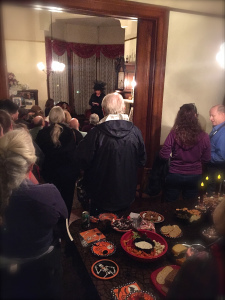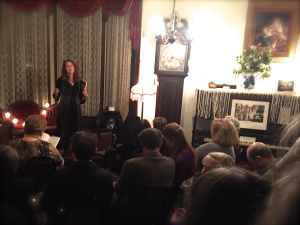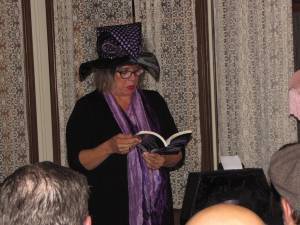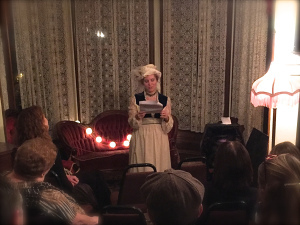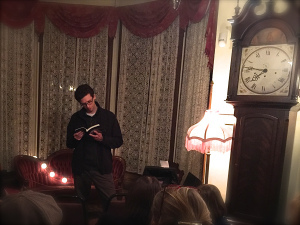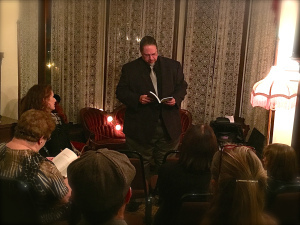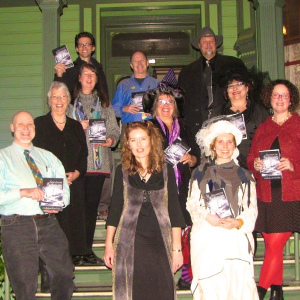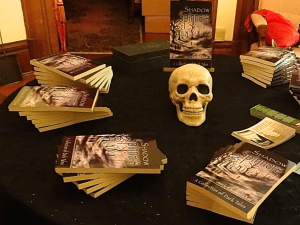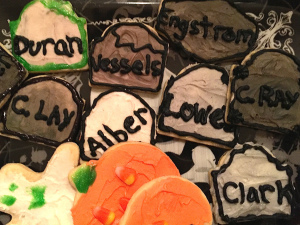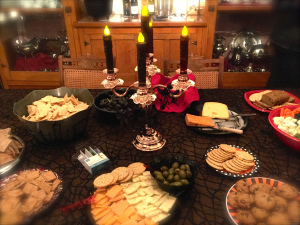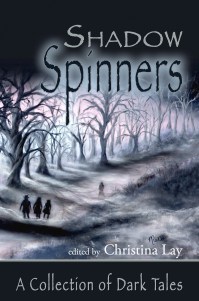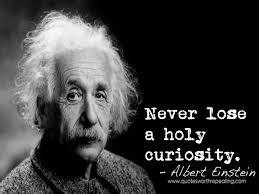Eric Witchey's Blog: Shared ShadowSpinners Blog , page 25
November 4, 2015
Book Launches and Kismet
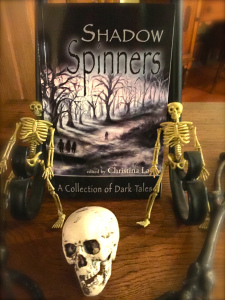 By Lisa Alber
By Lisa Alber
Some things are kismet. That I would meet a wonderful group of writers and bond with them, that we’d collaborate on a group blog, that we’d contribute stories to a collection, that we’d come together for a fantastic book launch.
Last week Christina Lay, our fearless leader, announced the publication of Shadow Spinners, A Collection of Dark Tales. This week I get to provide pictures of the launch party, which was held at the historic Shelton-McMurphey-Johnson House. As the website says, the house “… with its carved and turned exterior woodwork, polygonal tower, ornate open porches, and large bay windows – remains Eugene’s most elaborate example of late-Victorian Queen Anne Revival style architecture.”
The best part? It’s surely haunted. Some people are sure that Curtis Johnson, a World War I and II doctor, presides over the attic turret room, where he used to hole up and play solitaire.
Standing room only! Guests spilled into the entry hall and the dining room. That’s Cheryl Owen-Wilson reading her Southern gothic story.
Ringleader (in the best way) Christina Lay emcee’d the event.
And here are Cindy Coate Ray, Sarina Dorie, Matthew Lowe, and Stephen Vessels reading from their stories. The collection features a variety genres, from horror to literary to fantasy, and more.
Lots of books were sold, food and wine consumed, and hugs shared. It was a great night, and I’m so honored that I got to participate with my fellow Shadow Spinners!
Tagged: anthology, Dark Tales, fiction, writing


October 30, 2015
It’s Alive!
This week’s post is a little different than usual, because I finally get to announce the release of ShadowSpinners: A Collection of Dark Tales. What started out as a flickering idea in this writer’s fevered imagination is now an actual physical thing! (We’ll save arguments regarding wether or not an ebook is an actual thing for later.) For yes, we do have a print version, and it is truly a lovely thing to hold and fondle. With the invaluable aid of ebook wizard Pamela Herber and print formatting genius Matt Lowes, ShadowSpinners can now offer up some of the fiction we’ve been ranting about for the past two years. Thank you also to Cheryl Owen-Wilson for the gorgeous artwork.
I am profoundly grateful to be part of such an amazing group of writers.This has most definitely been a labor of love and I hope our enthusiasm for the project will warm your soul even as our stories chill your spine.
And now, so you’ll know what I’m raving about, here’s my introduction to the collection:
The tag line for the ShadowSpinners blog is “when nice people write bad things.” The writers whose works are included in this collection are nice people, mostly, in the daylight. But get us alone with our characters and bad things tend to happen. We’ve all written stories that have scared the wits out of friends and have earned us the question, often asked with a nervous chuckle, “Where on earth do you get these ideas?”
That is indeed an excellent question. Several of us have addressed it on the blog, (here, here and here) but while pondering how to introduce this rather eclectic collection, it came to me once again. Why do nice people write bad things? And what exactly makes a tale dark, anyway?
Within this volume you’ll find a broad compendium of styles, ranging from humorous to thoughtful to outright horrific. Yet there is a common thread, a dark undertow that explores the mysterious depths of the human psyche. The description “dark” can mean so many things, but in this volume the sense of something obscured, veiled by shadow, underlies each story, whether we are hearing the whispers of ghosts over the phone line, pondering the weight of a hollow existence, saving young souls from Satan or battling terrifying alien forces in the void of space.
Often, the darkness, the ghost, resides in our own minds. And when faced with an outside force of evil, an equal and opposing force may arise from within. Whether our characters will meet evil with evil or with an overcoming, triumphant strength is the question at the heart of many of these stories.
If you’re the sort of reader who likes to know what to expect, this might not be the volume for you. However, if you enjoy a rousing good yarn populated by fascinating characters in challenging situations, prepare to enjoy yourself.
Tagged: collection, Dark Fiction, fiction, ghost story, horror, new release, ShadowSpinners, short fiction, short stories


October 21, 2015
Story Telling for Story Writers
In the old days, when storytelling was mostly an oral tradition, story tellers could develop their stories over the course of many performances. With each performance of the tale, they could change a bit here or there, add some new element, or abbreviate a part for the sake of brevity. With each change, they could observe the reaction of the audience. They might notice a new detail gets a big laugh, or a particular part bores listeners if it goes on too long, or everyone wants to hear more about the villain, and so on.
In this way, over time, the story teller works out the details of a story, improves various elements, fine tunes the pacing, and zeroes in on the central themes. As writers, we generally don’t have this opportunity after a story is published. But there’s no reason why we can’t use this model to once they’re written, or even before.
One of the techniques I use to develop story ideas, is to tell myself the story in my head, usually over and over, before I even write a first draft. At the beginning it might not be much of a story at all. But little by little I work out a bit of story, however vague or flawed, and then with each reiteration I add new details, flesh out characters, find dramatic moments and situations, explore different scenes and variations, try out alternate beginnings and endings, and so on. All the while I’m seeking the soul of the story, something that resonates, that has impact.
As the story begins to take shape, it’s okay to jot down a few notes and even a preliminary outline. But everything should remain malleable, and when retelling the story in your head, it’s important not to refer to any notes or outlines. The parts that really work should stick in your head. And if something isn’t working, you need to be free of previous ideas to generate new possibilities, variations, and alternatives.
Everything you know about story craft can be brought to bear on this exercise. Open your entire toolbox and use what’s needed for analysis and improvements to structure, characterization, plot, setting, theme, et cetera. With each reiteration you can tackle various elements. Who is the protagonist? What is the main conflict? How do the characters change? What are the scenes? Does the end connect to the beginning? Does it have emotional impact? And so on, depending on the story.
Obviously this process isn’t for everyone, or every story. Some like to discover their story in the course of actually writing a draft, and some stories just won’t be found until you do write a draft. But writers debate over whether to outline or not, and I want suggest this as yet another option, a sort of tertium quid, a kind of narrative meditation. They’re all just ways of getting at a story, so use whatever works. No matter your method, new ideas, insights, and details will occur during writing. Once the pen hits the paper, all bets are off.
Tagged: creative process, creativity, fiction, Matthew Lowes, Short Story Writing, writing habits


October 14, 2015
Tales and the Walk-by Hugging, by Eric Witchey
Source: Nicolas McComber, istockphoto.
Tales and the Walk-by Hugging, by Eric Witchey
Why do we write? For money? For fame? For immortality? To validate our own view of the world? To prove something?
A recent experience at the grocery store brought new clarity to my answer to this question.
People who know me well know that I’ve been involved in a soul-sucking legal battle with corrupt corporate forces for the last five years. I more-or-less won that battle a couple months ago. Thank God. However, it was a terrible, wearing experience thrust upon me by corporate greed and corruption. About a month before that battle finally ended, I was feeling the wearying weight of it as soon as I woke up on a particular Thursday. I got up, engaged my autopilot, and shuffled off to the kitchen to fry a couple eggs and brew some coffee.
There were no eggs in the fridge. I had a Tourette’s moment and hoped the neighbors didn’t hear me.
I struggled making coffee. I screwed it up twice before I got a cup of coffee I could drink. I then discovered I had no half-and-half. Another Tourette’s moment.
I need cream. I can’t drink coffee without it. No, dammit, I refuse to drink coffee without it—and I don’t want any of that fake creamer crap, either. It’s not much to ask of the universe, but I do ask that my coffee have decent cream.
So, in rare existential form, I accepted defeat and acknowledged the fated fact that I was going to get a late start on the day. After making a list of three things to pick up at the grocery, I plugged in my earbuds to continue listening to my current audio book, The Disappearing Spoon, and headed down to Freddie’s, my local grocery.
In the more-or-less gray mental fog of my normal, pre-coffee dysthymic depressive experience, I found myself thinking about my brother-in-law’s illness, the periodic table, my lawyer, and the emotionally flat affect of the fiction I’d been producing. Somehow, I was pretty sure all these things were related, but I was too emotionally gray to force myself to tease out the relationships, preferring instead to let the words from the audio device intertwine themselves into my nonlinear interior monolog.
At the front door to the grocery, I encountered a crowd of very old people. Weaving my way through them, it dawned on me that I was seeing a crowd waiting for the bus service that takes otherwise house-bound seniors to get groceries. My 90-year-old British ex-pat neighbor lady, whom I take to doctor’s appointments and have tea with, had graced me with narrated versions of a few of her epic quests via these busses. The crowd seemed to be waiting, and a new thread showed up in my mental playlist.
Someday, if I’m lucky enough to live so long, I might be in that group. Do you think fiction groups and role playing games will be big in retirement homes when I get there? I hope so.
So, I passed on through, picked up my basket, and entered the store. Immediately, I was almost run over by a hurrying elderly woman. I saw her out of the corner of my eye and froze before we collided. It would have been like a Smart Car hitting a Peterbilt loaded with lumber. Just to be clear, her maybe 80 pound osteoporosis body was the whizzing Smart Car. My plodding, 180 pound meat suit was the overloaded truck.
I motioned for her to go ahead of me into the produce area. She nodded and hurried past, and I wondered what she might have forgotten. It occurred to me briefly that in such situations I almost always defer to others. I rarely feel like I’m late for anything, and I’m lucky that I don’t generally have to worry about my influence on other people’s schedules. Her bus was probably due to leave soon, and I certainly had no reason to slow her down.
Methodically, I found my cream, orange juice, and eggs while learning from my audio book that Madam Currie was believed by other women in her time to be a bit morally loose.
Just as M. Currie was gleefully pulling two male colleagues into a dark closet to show them a sample of material—material we would now call extremely hazardous—that glowed in the dark, I found a short checkout line at the 12 items and below lanes. I pulled my earbuds from my ears, put away my audio device, and prepared to engage with actual people.
A senior woman had beaten me to the line. She was engaged in a friendly chat with the checkout lady. From the look of it, I inferred that the old woman was getting in her once a week conversation with another human being, so I tried to relax and look unhurried in order to give her time to get her joy.
In the back of my mind, I wondered why I was doing that. Wasn’t I supposed to look like I was in a hurry and had very important things to do? Shouldn’t I cross my arms, scowl, and tap my foot?
I wondered what it would take to hype myself to that level of pointless behavior. I didn’t think I could it. I suppose that was because I wasn’t in a hurry and didn’t have really important things to do that hadn’t already been screwed by my lack of eggs and half-and-half.
So, I waited.
I scanned the tabloids.
I miss The World News Report. I used to read it in the checkout line. Now-a-days, I only see celebrity mags. There is not one single UFO alien bat baby hybrid LA housewife in the batch of broadsides. I wondered if that said something about our declining cultural sense of whimsy and humor?
The senior lady moved on, and the checkout lady checked out my “fewer than twelve items.” We said the normal things, and in mid-sentence, she grabbed something off the counter and bolted away as if I had just threatened to eat her soul. I checked my admittedly coffee-starved memory and confirmed that I had not, in fact, threatened to eat her soul.
She chased down the senior lady, who had only managed to get about ten yards closer to the front door. Apparently, the lady had left an item behind. The checkout woman and the senior chatted for a minute. The package changed hands.
In keeping with my previous musings, I thought to myself, this is where I’m supposed to get angry and say something rude. You’re not on script, Eric. Maybe with coffee I can be meaner.
The checkout lady came back and sheepishly finished ringing me up.
I saw a couple of boxes on the counter, and I asked if those might also belong to the senior lady.
Checkout lady sheepishly said, “No.”
I smiled, gathered up my bags, and for no reason I can name said, “It’s good that you are a kind soul.”
She lit up like a searchlight. We both parted, smiling.
I was smiling, but actually I was still living in my land of gray mists and muted mental tones. I was nearly to the front door when I realized she had felt guilty for making me wait while she helped the senior lady. A few steps later, I realized that I had said the right thing to let her feel some pride in what she had done. A few steps after that, I saw the Starbucks sign at the corner of the front of the grocery.
I thought I sprinted to the Starbucks, but I suspect I only managed a pre-senior shuffle. I had a gift card from my sister, and I planned to cut the fog with a serious coffee gift.
While waiting for my order, I watched the counter clerk and barista and realized that they had almost identical “I’m concentrating” expressions. While picking up my much needed 20 ounce, triple shot, vanilla latte, I asked the barista if the two of them were related.
She said no, and she asked me why I thought that.
I said, “You both make the same facial ‘I’m working’ expressions.”
Walking away, nursing my coffee, I heard the barista repeat what I said. The two women busted out laughing hard. I’m not sure why it was funny, but I’m glad it was.
In the lobby, there was still a crowd of seniors. I squeezed past a guy in a Steven Hawking wheelchair. He seemed about to panic because he was kind of boxed in and couldn’t easily shift his chair out of my way. He looked almost terrified.
I put a hand on his shoulder and gently said, “It’s okay. You’re fine.” He relaxed, and I slipped past him and moved on.
Crossing the lobby it occurred to me that I had just had a fairly nice sequence of interactions that took place mainly because I wasn’t in a hurry and have a habit of looking into people’s faces and thinking about how they feel and behave.
It’s a writer thing, or maybe I’m a writer because of it.
Anyway, I found myself thinking how sad it was that being in that “not in a hurry” space is not rewarded by our culture. Rather, our nation has one of the highest rates of anxiety illness in the world.
Still, I was only a few sips into my coffee, and this was all sort of mist-shrouded idle thought.
Outside the front door of the grocery, I actually met my neighbor lady friend—the bad-ass, blitz surviving war bride now in her tough as nails 90s. She was on her shopping run, and we had a smiling chat. I confirmed the next couple dates we had discussed for taking her to the doctor. She was thrilled. I was glad she was thrilled, and we also parted smiling.
I shuffled off to my car. On the way, my thoughts turned back to legal battles, flat fiction, bill paying, a lawn that needed mowing, allergies that would suck when I mowed the lawn, a deadline that was already past, and the general gray fog of living. At my car, I put my latte on the roof, fumbled for my keys, and heard a woman call out, “Hey!”
I was vaguely aware that I was pretty much alone in that part of the parking lot, and I had that little adrenaline moment where you realize that conversations that begin with “Hey!” rarely go well.
Keys a little tighter in my striking hand, I turned to face my assailant.
A fairly cute, red-headed thirty-something woman was walking purposefully toward me, her arms outstretched, her hands up high, and her fingers flipping in and out like people do when they are signaling that they are about to dock for a hug.
My assumptions were quick and fleeting.
She was a student I had forgotten.
She was someone from a seminar I had taught.
She was mentally compromised in an attractive, baby-faced, benign sort of way. She–
And she was on me and wrapping her arms around me.
I felt no fear or worry. I just accepted the hug and gave as good as I got. It was actually a very warm, caring sort of hug, and it was not at all what I expected—as if I had time to expect anything at all.
She pulled back, held my shoulders, looked directly into my eyes, and said in kind, sincere, and deliberate tones, “You, have a nice day.”
As she was turning to walk away, I said, “Thank you. You too.”
And she was gone. I was the victim of a walk-by hugging.
I have no idea what it was about. I speculated on whether she was behind me in the que or whether she had overheard me making arrangements to take my friend to the doctor. Somehow, I needed to equate the experience with some sort of reward for something I had done.
How sad that in that moment it couldn’t just have been two nice people acknowledging one another.
In that moment, the why wasn’t as important as getting groceries in the car and finding out if M. Currie scored in the closet. I gave up on speculation.
Currie didn’t score. She just got accused of naughtiness that she didn’t actually get to enjoy.
While arranging things and self in the car, it dawned on me that perhaps our acquisition-based culture teaches us to be pricks to each other, but the universe actually does reward us for being in the moment and kind to one another. The rewards just don’t have anything to do with culturally ingrained symbols of status-based success.
The rest of my day was one, long smile. The lawyer called to tell me we were winning. A conference called to invite me to a long seminar of teaching before the actual conference. Writing went well. I even noticed some little sparks of actual emotion in my prose.
For weeks, I found myself wondering if I could get away with walk-by huggings. In the end, I decided the middle-aged, frumpy writer-guy would not get the same reception from his victims that the cute redhead got.
Why do we write? We write because we can, for just the time it takes to read a story, let people calm down and be in themselves and in an imagined community that includes emotional connection to others. We write because we can see beyond the kind of car, the prestige of neighborhood, and the status of a rung on the corporate ladder. We can tell stories bring people who would never meet or interact into one another’s lives for a little while, and when they look up from the stories, they can see one another a little more completely—a little more compassionately and clearly. We write because we can reach out to others and give them time and a hug that leaves them smiling for the rest of the day. We write because stories of hope translating into success and connection are desperately needed in a world that has taught us not to make eye contact with the person standing next to us.
And some of us write because we can’t get away with walk-by huggings.
-End-
Tagged: art, author, belief systems, Characters, creative process, creativity, Emotion, Eric M. Witchey, Eric Witchey, fiction, hug, hugging, stories, Tales, why, why we write, writer, writing


October 7, 2015
A Scary Hallows Eve to All
By Cheryl Owen-Wilson
October is my favorite time of the year—a time of vibrant reds and oranges from falling leaves, and also a time when we celebrate Halloween and The Day of the Dead. I love all the accoutrements, from dressing up and becoming something or someone entirely different, to candles dripping with blood, to cauldrons boiling—I look forward to it all. For most of my friends their holiday is Christmas. They have storage units filled with shiny, sparkling baubles. My storage unit contains costumes, a coffin (see last years blog), cobwebs, spiders and of course skeletal remains. Most have a Santa and sleigh to adorn their roof. I however, have another vision and they’re not of sugarplums dancing in my head. I have a vision of skeletons crawling up and over my roof. I think perhaps after Halloween I’ll leave them and in December they can sport Santa hats. As a writer of Southern Gothic tales my Halloween props serve to inspire me. The other tool I use to get my muse going is to write poetry about my subject. So in honor of this month of howling wolves and all things long departed, I’ve redone a classic poem to suit my taste. I hope you enjoy, and if you happen to have a spare cadaver or two please send them my way. My collection is growing day by day. Please take a moment to tell me what inspires your writing.
A Scary Hallows Eve to All
Twas the night before Hallows Eve when all through the house, the Spirits were a’stirring, why there was even a dead mouse.
The cauldrons were hung by the chimney with care, bubbling and brewing a potion most rare.
The children were rising from their casket beds, while visions of voodoo dolls danced in their heads.
And mamma in her shroud and I with my top-hat, had just started rising from our long undead nap.
When out in the graveyard there arose such a clatter, I sprang from my crypt to see what was the matter.
Away to the mausoleum I flew like a flash, tore open a tomb and threw out some trash.
The hunter’s moon was just rising and cast a bright glow. Which gave a lustre of crimson to objects below.
When what to my bleary undead eyes should appear? But a gleaming black hearse, pulled by eight phantom deer.
With a sinister old driver so evil and bad, I knew in a moment it must be Count Vlad.
More rapid than banshees his courses they came, And he screeched, and he shrieked, and he called them by name.
Now Basher! Now Lancer! Now Cancer and Vixen! On Vomit! On Pudrid! On Squander and Nixon!
To the top of the graveyard, to the top of the pall, now slash away, bash away, thrash away all!
As dry brittle bones rattle, shake, scream and cry, when they meet with an obstacle, upon the most high,
So up to the tomb-top the ghoulish crew flew, with a hearse full of corpses, and Count Vlad of course, too.
And then in the darkness I heard on the roof, the scraping and clawing of each phantom’s hoof.
As I drew in my carcass and was turning around, down through the catacombs he came with a bound.
He was dressed in a cape from his head to his foot. His white shirt was all splattered with the blood he’d just took.
A bundle of bones he had flung on his back And he looked like a grave-robber just opening his pack.
His eyes—how they gleamed! His gaze was quite scary! His skin was like marble, his fangs made me wary.
And when he opened his mouth in a smile, don’t you know? Those fangs actually gave off a stunning, white glow.
Drips of scarlet still clung to the points of his teeth, and I drew in stale breathe as a blade he unsheathed.
He had the chiseled face of a Botticelli. But his demeanor was straight from the pages, of M. Shelley
Was he here on a mission, a demented black elf? I pondered and worried in spite of myself.
His eyes sought a tomb just above my skull’s head And soon I knew I had nothing whatsoever to dread.
He spoke not a word, but went straight to his work, and filled the tombs coffers then turned with a jerk.
And laying a bony finger aside of his nose, And giving a nod up through the graveyard he rose.
He sprang to his hearse, to his demons gave a shrill whistle, And away they all roared like a death seeking missile.
But I heard him cry out ere he drove from my sight, Scary Hallows Eve to All and to All a Good-Fright!
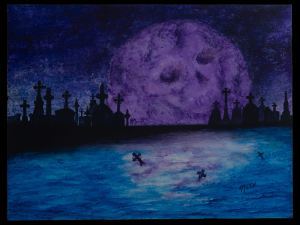
“Day of Dead Moon”
An Original Painting by Cheryl Owen-Wilson (MeCo)
Tagged: art, author, creative process, creativity, Day of the Dead, Halloween, MeCo, Painting, poetry, Southern Gothic, writing


A Scary Hallows Eve to All, by Cheryl Owen-Wilson
October is my favorite time of the year—a time of vibrant reds and oranges from falling leaves, and also a time when we celebrate Halloween and The Day of the Dead. I love all the accouterments, from dressing up and becoming something or someone entirely different, to candles dripping with blood, to cauldrons boiling—I look forward to it all. For most of my friends their holiday is Christmas. They have storage units filled with shiny, sparkling baubles. My storage unit contains costumes, a coffin (see last years blog), cobwebs, spiders and of course skeletal remains. Most have a Santa and sleigh to adorn their roof. I however, have another vision and they’re not of sugarplums dancing in my head. I have a vision of skeletons crawling up and over my roof. I think perhaps after Halloween I’ll leave them and in December they can sport Santa hats. As a writer of Southern Gothic tales my Halloween props serve to inspire me. The other tool I use to get my muse going is to write poetry about my subject. So in honor of this month of howling wolves and all things long departed, I’ve redone a classic poem to suit my taste. I hope you enjoy, and if you happen to have a spare cadaver or two please send them my way. My collection is growing day by day. Please take a moment to tell me what inspires your writing.
A Scary Hallows Eve to All
Twas the night before Hallows Eve when all through the house, the Spirits were a’stirring, why there was even a dead mouse.
The cauldrons were hung by the chimney with care, bubbling and brewing a potion most rare.
The children were rising from their casket beds, while visions of voodoo dolls danced in their heads.
And mamma in her shroud and I with my top-hat, had just started rising from our long undead nap.
When out in the graveyard there arose such a clatter, I sprang from my crypt to see what was the matter.
Away to the mausoleum I flew like a flash, tore open a tomb and threw out some trash.
The hunter’s moon was just rising and cast a bright glow. Which gave a lustre of crimson to objects below.
When what to my bleary undead eyes should appear? But a gleaming black hearse, pulled by eight phantom deer.
With a sinister old driver so evil and bad, I knew in a moment it must be Count Vlad.
More rapid than banshees his courses they came, And he screeched, and he shrieked, and he called them by name.
Now Basher! Now Lancer! Now Cancer and Vixen! On Vomit! On Pudrid! On Squander and Nixon!
To the top of the graveyard, to the top of the pall, now slash away, bash away, thrash away all!
As dry brittle bones rattle, shake, scream and cry, when they meet with an obstacle, upon the most high,
So up to the tomb-top the ghoulish crew flew, with a hearse full of corpses, and Count Vlad of course, too.
And then in the darkness I heard on the roof, the scraping and clawing of each phantom’s hoof.
As I drew in my carcass and was turning around, down through the catacombs he came with a bound.
He was dressed in a cape from his head to his foot. His white shirt was all splattered with the blood he’d just took.
A bundle of bones he had flung on his back And he looked like a grave-robber just opening his pack.
His eyes—how they gleamed! His gaze was quite scary! His skin was like marble, his fangs made me wary.
And when he opened his mouth in a smile, don’t you know? Those fangs actually gave off a stunning, white glow.
Drips of scarlet still clung to the points of his teeth, and I drew in stale breathe as a blade he unsheathed.
He had the chiseled face of a Botticelli. But his demeanor was straight from the pages, of M. Shelley
Was he here on a mission, a demented black elf? I pondered and worried in spite of myself.
His eyes sought a tomb just above my skull’s head And soon I knew I had nothing whatsoever to dread.
He spoke not a word, but went straight to his work, and filled the tombs coffers then turned with a jerk.
And laying a bony finger aside of his nose, And giving a nod up through the graveyard he rose.
He sprang to his hearse, to his demons gave a shrill whistle, And away they all roared like a death seeking missile.
But I heard him cry out ere he drove from my sight, Scary Hallows Eve to All and to All a Good-Fright!

“Day of Dead Moon”
An Original Painting by Cheryl Owen-Wilson (MeCo)
Tagged: art, author, creative process, creativity, Day of the Dead, Halloween, MeCo, Painting, poetry, Southern Gothic, writing


September 30, 2015
Curiosity, Creativity and Consciousness
“Love is the power to burst out of limitations and experience unity with other forms. Curiosity is a form of this power. It is the impulse, expressed through the intellect, to imagine the truth of something other than self. Curiosity is a compound of consciousness formed by imagination and longing.” Roland Toy
Curiosity is a powerful tool to change our lives, spark creativity and infuse our lives with possibility, and to become more creative. Curiosity is the engine that drives learning, new ways to interact with the world, and opens doors (and windows) to new worlds.
If our very consciousness is infused with an element of curiosity, and longing, it is our natural state of mind. In that case, it is just a matter of uncovering what already exists in us. These inclinations were often stifled in us as children; Einstein said it was a miracle that curiosity survives a formal education. Even as adults, we are surrounded by and bombarded with messages telling us to go to sleep and quit asking questions-curiosity is systematically stamped out. Perhaps fewer people ask questions because they are afraid of what the answers might be.
It is interesting that Curiosity has also been linked with sin and evil. When blind faith is prescribed, and questions are punished in a government, religion or group, curiosity is dangerous. Curiosity is dangerous to the status quo!
If you decide to live dangerously, and nurture a healthy curiosity, and possibly shake up your world, then here are some ways to do it.
Search out and question your assumptions. People with curios minds don’t assume they already know the answers. A stance of unknowing makes them open to new possibilities, and to seeing new answers for old problems.
Ask questions. Develop a sense of wonder. This makes your mind active, rather than passive. Writers root out the passive voice in fiction with a passion; we should bring the same passion to rooting out a passive mind.
The first question to ask oneself is, “What am I curious about? What am I interested in learning more about?” Even if it is just a glimmer of interest, pursuing it could lead to a passion.
One person I know makes a point of asking himself that question every new year. He asks what he is curious about, or interested in and then goes off and does it, whether it is building a radio from scratch, learning to sail, or learning to speak Italian.
Follow your passion is one insidious idea that is touted as gospel in recent times. People are desperate to discover their passion, or are depressed because they are afraid to quit their day job to follow their bliss. Kindling curiosity is a better way to find your path. In a recent interview Elizabeth Gilbert said:
“Forget about the notion of passion, and give your attention to your curiosity. Passion burns hot and fast, which means it can come and go. Curiosity is so accessible and available, every single day of my life. Only when I was in very deep, medicated depression did I not have curiosity. But most of the time, when you’re stuck, you can think, Is it possible that you can’t find one little tiny thing in the world that is interesting to you? And it may eventually lead you to your passion. But it’s also a cultivated skill, to learn to acknowledge and respect your curiosity.”
If you are curious to learn more, read the interview with Elizabeth Gilbert about how curiosity leads to creativity
And the article by Roland Toy on Curiosity-the Mysterious compound.
Tagged: author, creative process, creativity, curiosity, Psychology, writing


Curiosity, Creativity and Conscioussness
“Love is the power to burst out of limitations and experience unity with other forms. Curiosity is a form of this power. It is the impulse, expressed through the intellect, to imagine the truth of something other than self. Curiosity is a compound of consciousness formed by imagination and longing.” Roland Toy
Curiosity is a powerful tool to change our lives, spark creativity and infuse our lives with possibility, and to become more creative. Curiosity is the engine that drives learning, new ways to interact with the world, and opens doors (and windows) to new worlds.
If our very consciousness is infused with an element of curiosity, and longing, it is our natural state of mind. In that case, it is just a matter of uncovering what already exists in us. These inclinations were often stifled in us as children; Einstein said it was a miracle that curiosity survives a formal education. Even as adults, we are surrounded by and bombarded with messages telling us to go to sleep and quit asking questions-curiosity is systematically stamped out. Perhaps fewer people ask questions because they are afraid of what the answers might be.
It is interesting that Curiosity has also been linked with sin and evil. When blind faith is prescribed, and questions are punished in a government, religion or group, curiosity is dangerous. Curiosity is dangerous to the status quo!
If you decide to live dangerously, and nurture a healthy curiosity, and possibly shake up your world, then here are some ways to do it.
Search out and question your assumptions. People with curios minds don’t assume they already know the answers. A stance of unknowing makes them open to new possibilities, and to seeing new answers for old problems.
Ask questions. Develop a sense of wonder. This makes your mind active, rather than passive. Writers root out the passive voice in fiction with a passion; we should bring the same passion to rooting out a passive mind.
The first question to ask oneself is, “What am I curious about? What am I interested in learning more about?” Even if it is just a glimmer of interest, pursuing it could lead to a passion.
One person I know makes a point of asking himself that question every new year. He asks what he is curious about, or interested in and then goes off and does it, whether it is building a radio from scratch, learning to sail, or learning to speak Italian.
Follow your passion is one insidious idea that is touted as gospel in recent times. People are desperate to discover their passion, or are depressed because they are afraid to quit their day job to follow their bliss. Kindling curiosity is a better way to find your path. In a recent interview Elizabeth Gilbert said:
“Forget about the notion of passion, and give your attention to your curiosity. Passion burns hot and fast, which means it can come and go. Curiosity is so accessible and available, every single day of my life. Only when I was in very deep, medicated depression did I not have curiosity. But most of the time, when you’re stuck, you can think, Is it possible that you can’t find one little tiny thing in the world that is interesting to you? And it may eventually lead you to your passion. But it’s also a cultivated skill, to learn to acknowledge and respect your curiosity.”
If you are curious to learn more, read the interview with Elizabeth Gilbert about how curiosity leads to creativity
And the article by Roland Toy on Curiosity-the Mysterious compound.


September 23, 2015
Hypocrisy R Us
Facebook is killing me.
I am as invested as anybody else in the coming election, but even the people who lean the way I do are annoying me beyond belief. Even though I know I will become increasingly obsessed as the election draws near, right now, it’s too much.
So what can I learn from this with regards to fiction? What aspects of the human condition can I glean from this madness, so to enrich my work?
First: we are all the heroes of our own stories. I’ve always known that, and this statement is a solid center point in all my classes about writing fiction. The characters all think they’re doing the right thing. Or they’re doing the wrong thing, wishing they had a choice.
Everybody in real life thinks that if the world would only vote the way they voted, or parent the way they parent, or eat the way they eat, or drive the way they drive, the world would be a better place.
Second: we have little patience for those who do not vote, parent, eat, drive, etc. the way we do.
Third: We love to spout the memes, but they are for instructing other people, not for introspection as to how we might be the change we want to see. We’re doing just fine, you see, wasting gas and throwing plastic water bottles into the trash while telling other people to save the planet.
So what is the bottom line here? Are we all hypocrites?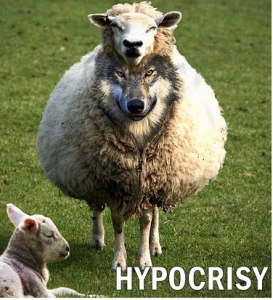
Apparently. We say one thing and we do another. Why are we so surprised when the harsh spotlight on political candidates illuminates their hypocrisy?
This is what makes literature so important. We toss characters into unbearable conflict and watch them work their way out of it in ways we would never imagine. We never see ourselves in this type of conflict (we all work hard to avoid conflict), so we’re fascinated by our reactions to the characters. And we learn about ourselves from the safety of a favorite reading spot.
But are our characters always consistent in what they say and what they do? Are we cheating our readers by not pointing out the hypocrisy of the human condition? Or are the best villains the ones who blatantly tout their duplicity?
Think through your list of favorite villains. Are the best ones unapologetic about their treachery? I think so.
Humans are wonderfully complex creatures. How lucky we are to be in a career that gets to mine all the treasures so deeply planted in our psyches.
And tomorrow I will continue to decry the political noise on Facebook even as I add to it.
Tagged: elections, facebook, heroes, hypocrisy, politics, the human condition, villainy, writing


September 16, 2015
So, How’s the Novel Coming Along? Muddles and Middles
By Lisa Alber
Commercial interruption: I’m honored that KILMOON was nominated for the Silver Falchion Reader’s Choice Award (Best First Novel–Cozy, Traditional, Historical)! If you so desire, please vote here. I appreciate it, thanks! (If using a mobile device, first click “Switch to desktop site” on the bottom of the page.)
–//–
 Wow, a lot can happen in six weeks. I read my previous post, in which I was very much the tortured writer as I began writing the first draft of my third novel. I was having a hard time feeling my way into the story. I probably had around 5,000 words written (approx. 20 pages) at the time.
Wow, a lot can happen in six weeks. I read my previous post, in which I was very much the tortured writer as I began writing the first draft of my third novel. I was having a hard time feeling my way into the story. I probably had around 5,000 words written (approx. 20 pages) at the time.
I wrote:
I’m getting words down on virtual paper every day and trying to maintain faith that at some point (please, let it be within 50 pages!), I’ll feel a surge as I realize what the heart and soul of the story really is. In other words, I’m faking it a little bit right now–at least that’s what it feels like.
Now I have exactly 33,101 words. Pretty good! That’s about 132 pages. So, did the story’s heart and soul open itself up to me?
Yes!
Amazingly, the process works. I’ve once again re-learned this lesson and found my faith in the process. It’s not that what I wrote is stellar. I can go back to any scene and fix dozens of typos, jot notes about missing descriptions, and growl because the story has already changed since I wrote that scene. But that’s OK because this is only a first draft. I continue on, knowing that I’ll return to the fixes later.
So now I’m approaching the dreaded muddle in the middle. Well, I’m officially in it I suppose. I’ve got plot tentacles waving around in every direction, a subplot that feels stupid and useless beyond words, and mishaving characters.
Like, eh hem, sex!!!! I don’t write novels with sex in them, I really don’t. Now, I might have been thinking about an interlude between two of the characters but not until later, AFTER the midpoint. Not yet, for god’s sake.
I was just a little surprised is all. However, after letting the scene sit a few days, I’ve decided that these two upstart characters knew what they were about better than I did. The fact that they sleep together so quickly is a surprise to them too and not without some fallout, which is crucial to the overall plot.
So there we go: crisis averted!
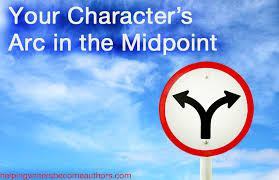
This pretty much sums it up.
I wrote my first two novels without thinking about story arc and three act structure and all that jazz. At least not consciously. For this novel I did something different: I thought about structure before I started writing. Nothing elaborate, you understand, because I’m not organized enough to write actual outlines. But I had an overall arc, including the all-important midpoint game changer.
To get all mathematical about it, the midpoint would be about, say, 45,000 words in. I know what’s going to happen in a general sense. I don’t know how I’m going to get there, but I can feel my brain working on it in the background. My scenes are rising to that occasion because I’m setting the intention for them to do so.
I’m thinking the surprise sex scene is part of that. (To clarify: No sex on the page. It’s a Captain-Kirk-pulling-on-his-boots scene with waaay more drama.)
The best part is that unlike my previous two novels, I’m not drowning in the middle muddle. I’m splashing around a bit, but I’m afloat. Having that midpoint to work toward is saving my hiney!
I can’t tell you how jazzed I am overall … even though … Never mind, this is only the first draft!
What a difference six weeks make, that’s for sure.
So tell me about you. Whatchou been up to these past six weeks? How did summer treat you?
Tagged: Kilmoon, midpoints, novels, plotting muddle in the middle, Silver Falchion, story arcs, writing


Shared ShadowSpinners Blog
- Eric Witchey's profile
- 51 followers



